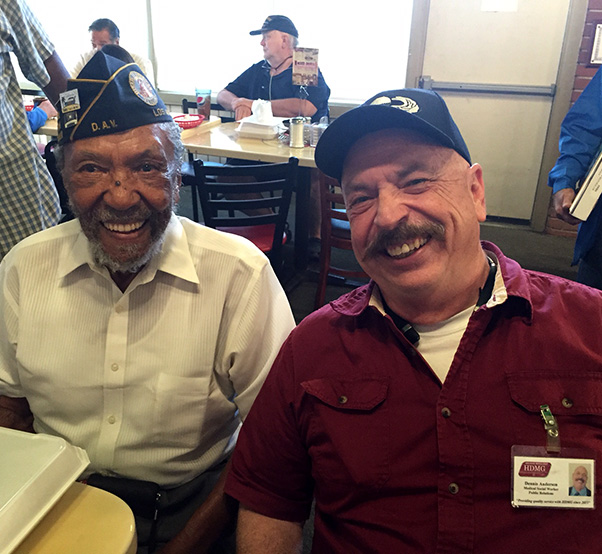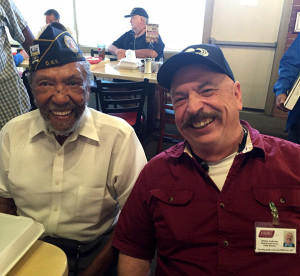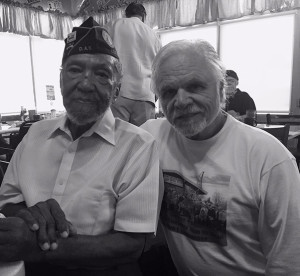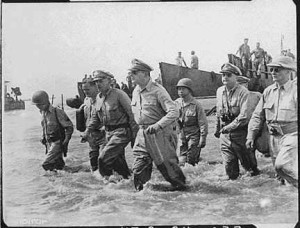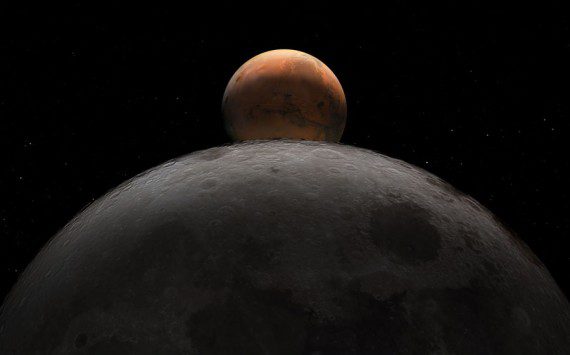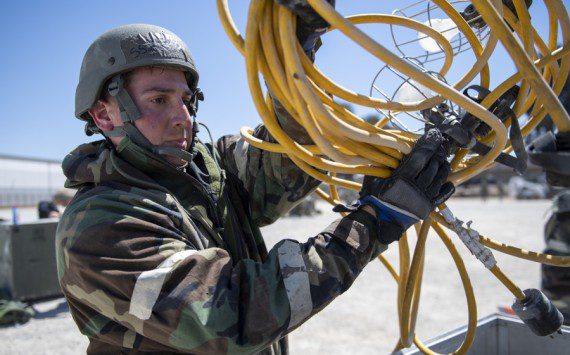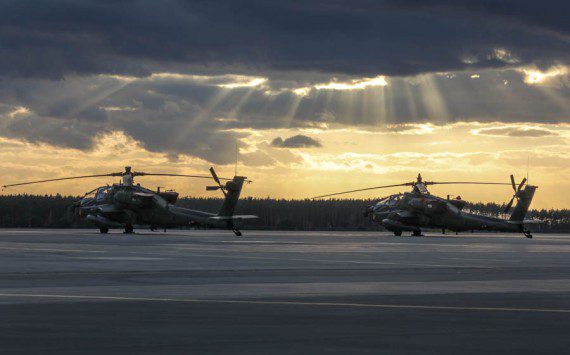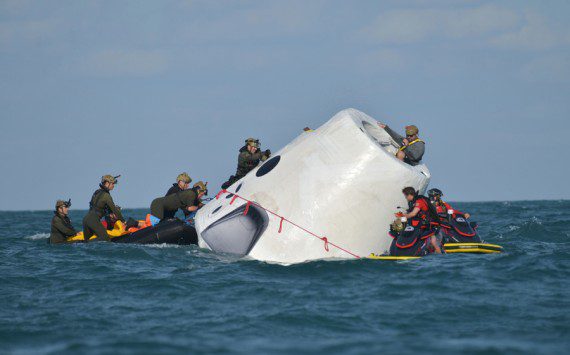Former Army 1st Sgt. Felix Jamison and Aerotech writer Dennis Anderson.
LANCASTER, Calif.–It is less remembered as the invasion of Leyte in present times than the historic moment during World War II when Gen. Douglas MacArthur waded ashore in the surf of the Philippine Islands to announce “I have returned.”
For MacArthur, it was the culmination of his vow that he would return after Japan invaded the Philippines after Pearl Harbor. The forces of Imperial Japan seized Corregidor and Manila, took thousands of American and Filipino POWs and sentenced them to the Bataan Death March, a captivity that ultimately killed and caused the death of thousands.
The Japanese imposed a harsh rule that prompted Filipinos to initiate a guerrilla war against their occupiers that lasted for three years until the return of MacArthur and American forces.
For Felix Jamison, who turns 100 years old on Dec. 10, rolling ashore in a 6×6 truck onto the invasion beach was the culmination of all the training he had endured, and all the training he meted out.
In a segregated Army, Jamison, an African-American from rural Louisiana, was a leader.
Jamison, 99, was a first sergeant, a combat support trucker with the 3670th Combat Quartermaster unit, an all-black unit that rolled supplies–mostly bullets–to the troops under fire in the front line.
“To get those bullets delivered, you had to get pretty close,” the former first sergeant recalled. “My truck was the first 6-by-6 onto the beach at Leyte.”
That was late in the morning of invasion day, Oct. 20, 1944, the first phase of retaking the Philippine Islands from the Japanese. By early in the afternoon, MacArthur would wade ashore, announcing to a coterie of military press that he had kept his promise.
World War II Army 1st Sgt. Felix Jamison, 99, and Vietnam War veteran Ronnie Baker.
Now, with General MacArthur simply the “soldier who fades away” a half century ago, Jamison remains, vital and chipper approaching the century mark.
At the Coffee4Veterans weekly event hosted at Crazy Otto’s Restaurant, a representative for Rep. Steve Knight, R-Antelope Valley, presented a U.S. flag flown over the Capitol to honor Jamison’s contribution to the nation’s armed services.
Typically, either Knight, or his veterans’ field aide, Christine Ward, present the honors.
“We consider it one of the happiest and most important things we do,” Knight said recently at a medals and award presentation at the Coffee4Veterans event. “We want to make sure that our veterans receive the medals they earned, and get the recognition that they deserve.”
For Jamison, his trip to the restaurant that usually fills up with nearly 100 veterans every Tuesday morning was just a fresh mark of his passage through a century of living that marked passage through two World Wars, the Cold War, the Space Race and the Civil Rights struggles.
Jamison was raised north of Shreveport, La., and fared better than many because he was able to work for his father who had a timber business.
Because of that business, Jamison had a driver’s license at a very early age, a license for driving a big truck. So, when he enlisted in the Army about a year before Pearl Harbor, the Army put that license, and the driving experience that went with it, to work.
“After I got my training, I became a drill sergeant, then a training sergeant, then a first sergeant,” Jamison recalled.
By the time he arrived with his unit in a Landing Ship Transport, he was in his late twenties–one of the “older hands.” They disembarked in Australia, and went on to run resupply in New Guinea, Hollandia – now the Solomon Islands — and then, onto the recapture of the Philippines.
“When that big landing barge opened, my C.O., who was a good man, didn’t want me to go first to the beach,” Jamison recalled. “It was hot, and he didn’t want me hurt. I told him I had trained these men, and because I was the one that trained them, I had to go.”
The retiree, who resides in Palmdale, looks years younger than his actual age. At the Sept. 20 honors, he wore a crisp, white dress shirt and a forage cap with insiginia of a commander of Disabled American Veterans.
General MacArthur wades ashore at Letye in the Philippines.
As Jamison shared his story, other veterans would approach him at the crowded diner. Some saluted. Some asked just to shake his hand.
Jamison said he has kept his outlook on life optimistic despite living through years of segregation in the Army and the pre-Civil Rights South. “I determined early in life, as young as 9 years old, that I would try to understand life, and to understand life, I would have to be able to first understand myself,” he said.
Jamison “is ‘The Greatest Generation,’ and that’s why we wanted to bring him in here to be honored,” said Ronnie Baker, a Vietnam War veteran who is one of the informal emcees at the weekly Coffee4Veterans.
Juan Blanco, a Cold War paratrooper who served in Europe, said, “Nobody asks anything of anybody in here. This is their time to socialize, to be together, to just come in and have a good time as veterans.”
The event has been rolling out for about four years and is hosted by restauranteur Jin Hur, a Korean-American whose relatives all fought in the Korean War, and his older brother, who was a Republic Of Korea military physician during the Vietnam War.
“This is the veterans’ breakfast,” Hur says. “This is for them.”
For Jamison, the breakfast offered an opportunity to reflect on his near century of living through times of turbulence.
“When I left the Army after the war, we decided to move from the South,” he said.
In California, he established his family in Los Angeles, where he worked first at North American Aircraft, and later for decades at the Los Angeles Department of Water and Power.
“My Army experience is what made them promote me, and made me a supervisor,” he said.
Among his other leadership experiences in addition to leading men during some of the most fractious battles of World War II, he served for at least seven years in a Los Angeles chapter of Disabled American Veterans.
Editor’s note: Dennis Anderson was an Iraq War embedded journalist and Army veteran of the Cold War. He works as a clinical therapist with a veterans community outreach for High Desert Medical Group






